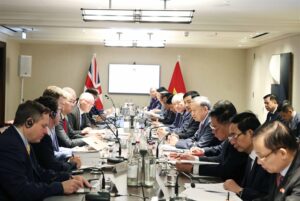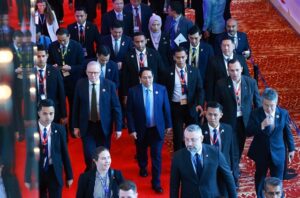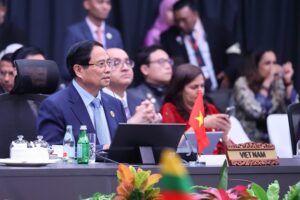Vietnam and Cuba Discuss Strengthening Agricultural Collaboration in Hanoi

Hanoi, The Gulf Observer: Vietnam’s Minister of Construction Nguyễn Thanh Nghị and Cuba’s Minister of Agriculture Ydael Jesus Perez Brito held a meeting on December 9 in Hanoi to discuss enhancing bilateral cooperation in rice production. The meeting underscored the shared commitment to agricultural collaboration as a cornerstone of the Vietnam-Cuba partnership.
Key Initiatives and Projects
Minister Nguyễn Thanh Nghị highlighted that the Ministry of Construction (MoC), as the lead agency for Vietnam in the Vietnam-Cuba Intergovernmental Committee, has prioritized economic, trade, and investment cooperation with Cuba, particularly in agriculture. He outlined Vietnam’s current support for three agricultural projects in Cuba:
- A rice production development project (2019–2025).
- Two new projects on aquaculture and maize production (2023–2025).
The Vietnamese Government has tasked the Ministry of Agriculture and Rural Development (MARD) with developing a proposal for a new rice production cooperation project for the 2025–2027 period. The initiative aims to create an effective agricultural model to enhance Cuba’s food security.
Vietnam has also expedited the supply of rice to Cuba under bilateral agreements and encouraged Vietnamese enterprises, including Agri-VMA Co. Ltd. and the Thái Bình company, to invest in agricultural production in Cuba. Thái Bình is preparing a feasibility study for a multi-faceted project encompassing rice and soybean production, soybean oil processing, and livestock farming.
Addressing Challenges and Expanding Cooperation
Minister Nghị called on Cuba’s Ministry of Agriculture to work closely with Cuban agencies and the MARD to resolve challenges faced by Vietnamese businesses investing in Cuba. Key areas of focus include land use, labor policies, material importation, taxation, and foreign exchange.
Cuba’s Minister Perez Brito assured Vietnam of strong Cuban support, sharing that a working group led by Deputy Prime Minister Ricardo Cabrisas Ruiz has been established to oversee the implementation of bilateral agreements.
To meet Cuba’s annual rice demand of 600,000 tonnes, the minister proposed increasing the rice cultivation area from 20,000 hectares to 100,000 hectares, with 200,000 hectares currently available for farming. He noted that Cuba has readied all necessary resources, including infrastructure, irrigation systems, machinery, and labor.
Perez Brito expressed optimism about the success of cooperation projects and emphasized measures Cuba has implemented to support Vietnamese investors, such as granting land use rights free of charge and permitting direct recruitment of Cuban workers—unprecedented for foreign investors in Cuba.
Future Prospects
Minister Nghị welcomed the progress made and emphasized completing initial projects successfully to build confidence for further expansion. He also encouraged Cuba to explore multi-crop farming techniques, drawing from Vietnam’s agricultural expertise, to boost rice yields and diversify production.
The MoC pledged continued collaboration with relevant agencies to propose favorable policies, ensuring the success of Vietnam’s agricultural cooperation initiatives in Cuba. This deepened partnership is expected to enhance food security in Cuba and foster greater economic collaboration between the two nations.


